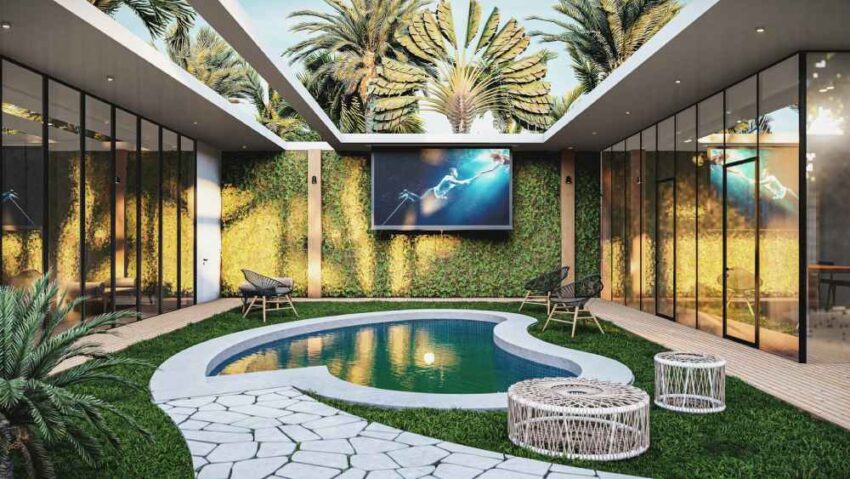Transforming your backyard into a private aquatic retreat is an exciting endeavor that can enhance your lifestyle and increase your property’s value. Whether you’re looking to create a serene escape or a vibrant entertainment hub, designing the perfect pool requires careful planning and consideration. This guide will walk you through the essential steps to bring your dream pool to life.
Understanding Your Vision
Before diving into the specifics of pool design, take time to clarify your vision:
– Purpose of the pool (relaxation, exercise, entertainment)
– Desired atmosphere (tropical paradise, modern minimalist, natural lagoon)
– Integration with existing landscaping and architecture
– Long-term plans for your outdoor space
Having a clear vision will guide your decisions throughout the design process.
Assessing Your Space
A thorough evaluation of your backyard is crucial:
– Available space and shape
– Sunlight exposure and shaded areas
– Soil type and terrain
– Existing structures and vegetation
– Access points for construction equipment
Understanding these factors will help determine the feasible size, shape, and location of your pool.
Choosing the Right Pool Type
Decide between these main pool types:
In-ground Pools:
– Concrete: Highly customizable, durable, but more expensive
– Fiberglass: Quick installation, low maintenance, limited shapes
– Vinyl: Cost-effective, versatile, may require liner replacement
Above-ground Pools:
– More affordable and easier to install
– Can be moved or removed if needed
– Limited design options compared to in-ground pools
Designing the Pool Shape
Popular pool shapes include:
– Rectangle: Classic and versatile, ideal for lap swimming
– Freeform: Natural-looking, mimics ponds or lagoons
– L-shape: Separates shallow and deep areas
– Kidney: Soft curves, complements landscaping well
– Geometric: Modern look with clean lines and angles
Choose a shape that complements your home’s architecture and fits your intended use.
Determining Depth and Size
Consider these factors when deciding on pool depth and size:
– Intended activities (diving, water sports, wading)
– User demographics (children, adults, seniors)
– Safety considerations
– Local building codes and regulations
A varied depth can accommodate different activities and users.
Incorporating Water Features
Enhance your pool’s aesthetic appeal with water features:
– Waterfalls or cascades
– Fountains
– Bubblers
– Laminar jets
– Infinity edges
These features add visual interest and soothing sounds to your pool area.
Selecting Pool Finishes
Choose finishes that align with your design vision:
– Interior finish: Plaster, pebble, tile, or vinyl
– Coping: The material that caps the pool edge
– Decking: The area surrounding the pool
Consider durability, slip-resistance, and heat absorption when selecting materials.
Lighting Your Aquatic Paradise
Well-planned lighting enhances safety and ambiance:
– Underwater lights for a magical nighttime glow
– Deck lighting for safe navigation
– Landscape lighting to highlight surrounding features
– Color-changing LED options for versatility
Planning the Pool Surround
Create an inviting poolside area with:
– Comfortable seating options
– Shade structures (pergolas, umbrellas, cabanas)
– Outdoor kitchen or bar area
– Fire features for cooler evenings
– Lush landscaping for privacy and aesthetics
Prioritizing Safety Features
Incorporate essential safety elements:
– Secure fencing with self-latching gates
– Non-slip decking materials
– Pool covers for when not in use
– Clearly marked depth indicators
– Adequate lighting around the pool area
Considering Eco-Friendly Options
Reduce your pool’s environmental impact with:
– Energy-efficient pumps and heaters
– Solar heating systems
– Saltwater chlorination
– Automatic pool covers to reduce evaporation
– Native, drought-resistant landscaping
These options can also lead to long-term cost savings.
Planning for Maintenance
Design your pool with easy maintenance in mind:
– Efficient filtration and circulation systems
– Automated cleaning systems
– Easy-to-clean surfaces and materials
– Adequate storage for pool equipment
Navigating Regulations and Permits
Research and comply with local requirements:
– Zoning laws and setback regulations
– Safety standards
– Homeowners association approvals
– Building permits
Working with a professional pool designer can help ensure compliance.
Bringing Your Design to Life
Once your design is finalized:
– Get multiple quotes from reputable pool contractors
– Review portfolios and check references
– Discuss timeline and potential challenges
– Plan for landscaping and finishing touches
Conclusion
Designing the perfect pool for your backyard is a journey that combines creativity, practicality, and careful planning. By considering all aspects – from the initial vision to the final details – you can create a stunning aquatic retreat that enhances your lifestyle and becomes the centerpiece of your outdoor living space.
Whether you’re envisioning peaceful solo swims or lively pool parties, your custom-designed pool will be a source of joy, relaxation, and cherished memories for years to come. With thoughtful planning and execution, your backyard oasis will not only meet your immediate desires but also adapt to your changing needs, providing a lifetime of aquatic enjoyment.

